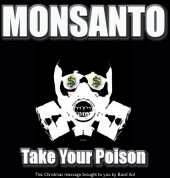Radio Mundo Real
http://radiomundoreal.fm/6840-turning-point
20 de junio de 2013 | Entrevistas

Turning Point
Interview with Eric Hoffman, Food & Technology Policy Campaigner at Friends of the Earth US
Last week, FOE Europe published a study which found traces of herbicide glyphosate in urine analyses of people from 18 European countries. These tests, made on 182 people, were carried out by an independent laboratory in Germany, and found traces of the chemical in samples from all countries,
There are numerous concerns about the safety of this product (mainly its effects on the hormone system, and its impact on the environment in general), and the arguments against it are increasingly convincing. Glyphosate is the world’s best-selling weed killer and one of the most widely used herbicides in Europe, such as Monsanto’s Roundup. It is applied in farming, forestry, parks, public spaces and gardens. It is also very used in the production of genetically modified herbicide resistant crops. Basically, it kills any plant not genetically modified to resist it. For example, glyphosate can be used to kill weeds in a field before a crop is sown, before it germinates, or after it has been harvested. Glyphosate is also sprayed onto crops 1 to 2 weeks before they are harvested to make them dry out and easier to harvest. This practice is called dessication. We still do not know exactly how these traces were assimilated by people, how wide their presence in the environment is, and how it is affecting our health.
«I think in general we need more studies conducted to see what the main impacts are on the human body», said Eric Hoffman.
Glyphosate’s weed-killing properties were patented by US company Monsanto in the 1970s. Since then, other pesticide companies have marketed their own glyphosate products, and many hundreds of different glyphosate-containing herbicides are now sold around the world. Despite this competition, Monsanto has used a range of strategies to keep its hold on the market and still accounts for around half of global production. Currently, no GM herbicide resistant crops have been authorized for commercial production in the European Union, but there are 14 applications for approval of GM glyphosate resistant crops being considered by the European Commission. If they are approved by the EU, glyphosate use will inevitably increase. Based on evidence from the US, it has been predicted that the introduction of GM glyphosate resistant sugar beet, maize and soybean could lead to an 800% increase in glyphosate use by 2025, with overall herbicide use going up 72% compared to current levels. But the recent discovery of genetically modified wheat of Monsanto in plantations in the US raised criticism against the company.
« It confirms the need to impose stricter controls on agribusiness", said Lisa Archer, director of the Food and Technology Program at Friends of Earth US
Click here for details about the study
Photo: http://www.davidicke.com/